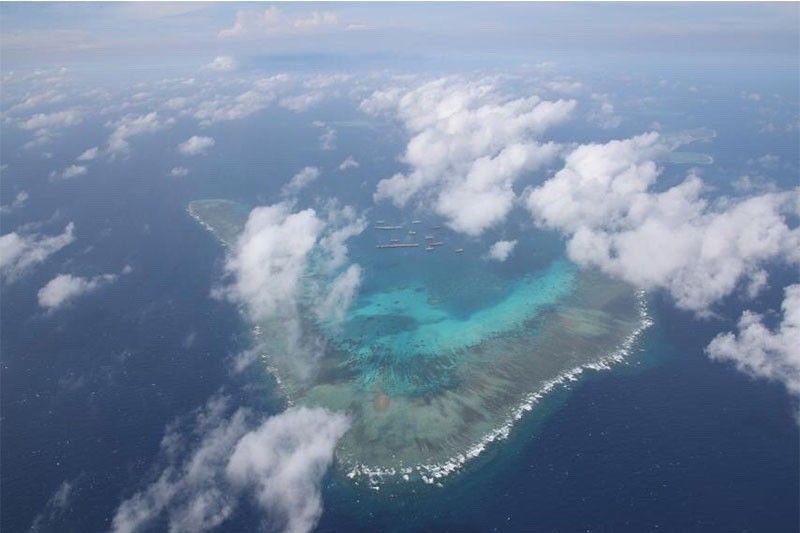Chinese ships in West Philippine Sea meant to pressure Duterte on VFA, expert says

MANILA, Philippines — The hundreds of Chinese ships seen swarming Julian Felipe (Whitsun) Reef since December 2020 were sent there to pressure President Rodrigo Duterte to terminate the country's Visiting Forces Agreement with the US, an expert said Tuesday.
Carlyle Thayer, professor emeritus at the University of New South Wales Canberra and the Australian Defence Force Academy, said that China's outsized presence in the West Philippine Sea reef was meant "to disrupt any possibility of getting the US alliance with the Philippines reinvigorated and demonstrate that the US has no strategy that would alter the status quo.”
He shared this assessment during an online forum hosted by the Foreign Correspondents Association of the Philippines.
“The arrival of China’s maritime militia and fishing fleet at Whitsun Reef, in my opinion, is designed to put pressure on Duterte, who equivocates on whether or not he's going to terminate the Visiting Forces Agreement."
The Philippines expressed its intent to terminate the VFA in February 2020, after the cancellation of Sen. Ronald dela Rosa's US visa earned Duterte's ire, but has suspended the abrogation twice, also at the president's instruction.
'Action-reaction cycle'
Thayer also said China's swarming of Julian Felipe Reef forms part of an "action-reaction cycle" that began during the Trump administration and has continued during the Biden administration.
"The US would flex its muscles, China would push back," he said. "So we're seeing counter People's Liberation Army deployments to what the Biden administration is sailing through the South China Sea."
He was referring to US freedom of navigation operational patrols, naval presence patrols, flights of strategic bombers from the continental US, aerial reconnaissance, and the presence of carrier strike groups, that have combined into a carrier strike force on some occasions, in the critical waterway.
Warships from US allies such as Japan, Australia, Canada, France, United Kingdom, and the Netherlands have also made increased appearances in the South China Sea, Thayer noted while adding that more deployments from these nations are expected for military exercises.
What's happening now?
The Department of Foreign Affairs on Tuesday announced that it summoned Chinese Ambassador Huang Xilian to discuss the continued presence of Chinese ships within the vicinity of Julian Felipe Reef — the first time it has summoned a Chinese envoy since 2019 when a Filipino fishing boat Gem Ver was sunk by a Chinese vessel.
Shortly after, top diplomat Teodoro Locsin Jr. said only nine Chinese ships remain in the area.
The development comes after the country's departments of defense and foreign affairs traded uncharacteristically heated statements with the Chinese embassy. The DFA last week also began filing diplomatic protests for every day that some 44 ships continued to linger within the reef's vicinity while the Department of National Defense sent more ships to the area.
The US and many of its allies, the same ones earlier referenced by Thayer, also called on China to adhere to rules-based order consistent with international law, including the UN Convention on the Law of the Sea, leaving Beijing incensed.
In all this time, however, Duterte has been silent on the issue.
He has raised the Philippines' arbitral win over the West Philippine Sea at the UN but has repeatedly made the claim that taking any action on the maritime dispute would be tantamount to going to war with China.
While the flare-up surrounding Julian Felipe Reef seems to be calming down, Thayer said heightened tension in the South China Sea is "inevitable" due to the action-reaction process he previously described.
"The military balance in the Indo-Pacific is becoming more unfavorable to the US and that raises the risk that China will become emboldened to alter the status quo," he said, referencing an assessment made by Washington.
- Latest
- Trending






























